This content originally appeared on Democracy Now! and was authored by Democracy Now!.
This post was originally published on Radio Free.
This content originally appeared on Democracy Now! and was authored by Democracy Now!.
This post was originally published on Radio Free.
This content originally appeared on Democracy Now! and was authored by Democracy Now!.
This post was originally published on Radio Free.
This content originally appeared on Democracy Now! and was authored by Democracy Now!.
This post was originally published on Radio Free.
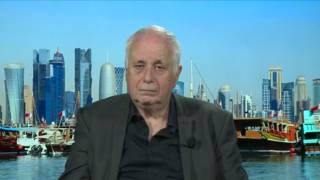
We speak with renowned Israeli historian Ilan Pappé about his recent trip to the United States, when he was interrogated for two hours by federal agents upon arrival at Detroit airport about his political views on Gaza, Hamas and Israel, as well as demanding to know whom he knew in U.S. Muslim, Arab and Palestinian communities. Pappé was only allowed to enter the country after agents copied the contents of his phone. “They refused to tell me why they stopped me,” he says. Pappé, author of The Ethnic Cleansing of Palestine, also discusses the Nakba, growing support for Palestinian rights, and why he believes “the collapse of the Zionist project” is imminent.
This content originally appeared on Democracy Now! and was authored by Democracy Now!.
This post was originally published on Radio Free.
This content originally appeared on Democracy Now! and was authored by Democracy Now!.
This post was originally published on Radio Free.
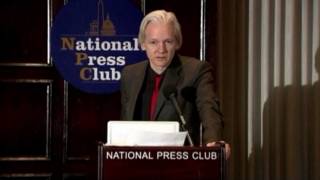
WikiLeaks founder Julian Assange on Monday won the right to appeal his extradition to the United States. Assange’s lawyers argued before the British High Court that the U.S. government provided “blatantly inadequate” assurances that Assange would have the same free speech protections as an American citizen if extradited from Britain. Assange has spent more than a decade facing the threat of extradition to the U.S., where he faces up to 175 years in prison for publishing classified documents exposing U.S. war crimes in Iraq and Afghanistan. “This is a victory for Julian Assange in that he lives on to fight another day, his case lives on to fight another day. But he’s not out of Belmarsh [Prison] yet, and he’s not in the clear yet,” says Chip Gibbons, policy director of Defending Rights & Dissent. “This could still end in him being sent to the U.S. And the person who can stop this is Joe Biden and Merrick Garland.”
This content originally appeared on Democracy Now! and was authored by Democracy Now!.
This post was originally published on Radio Free.
This content originally appeared on Democracy Now! and was authored by Democracy Now!.
This post was originally published on Radio Free.
This content originally appeared on Democracy Now! and was authored by Democracy Now!.
This post was originally published on Radio Free.
This content originally appeared on Democracy Now! and was authored by Democracy Now!.
This post was originally published on Radio Free.
This content originally appeared on Democracy Now! and was authored by Democracy Now!.
This post was originally published on Radio Free.
This content originally appeared on Democracy Now! and was authored by Democracy Now!.
This post was originally published on Radio Free.
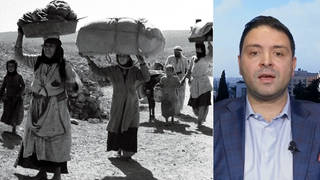
Palestinians across the globe are marking the 76th anniversary of the Nakba — which means “catastrophe” in Arabic — when those establishing the state of Israel violently expelled over 700,000 Palestinians. Palestinian historian Abdel Razzaq Takriti says closer to 900,000 Palestinians were forced out or massacred during Israel’s founding, which is being celebrated inside Israel with calls to ethnically cleanse and settle the Gaza Strip and the occupied West Bank. “The Nakba is continuing. This is a colonial continuum,” says Takriti. “It’s not enough to commemorate. It’s not enough to talk about it. We have to stop it right now. … The first step to doing that is to stop the genocide in Gaza.” Takriti lays out four principles for Nakba education: refuting Nakba denialism, recognizing the Nakba is part of an ongoing process of settler colonialism, stopping that process, and then reversing it by restoring Palestinian national rights.
This content originally appeared on Democracy Now! and was authored by Democracy Now!.
This post was originally published on Radio Free.

Democracy Now! speaks with Dr. Adam Hamawy, one of around 20 American medical workers trapped in Gaza after Israel closed the Rafah border crossing into Egypt. A plastic surgeon and Army veteran, Hamawy is on a volunteer mission with the Palestinian American Medical Association at the European Hospital in Khan Younis. Like many Gazans, the U.S. medical workers are now facing dehydration and other deadly health conditions. “We’re continuing to do our job. … It’s tiring, but this is exactly what we need to be doing,” says Hamawy, who calls on President Biden to stop supporting Israel’s assault on Gaza. “If my best friend is a serial killer, I’m going to stop being his friend.” Hamaway describes treating “massive” injuries to civilians in Khan Younis, where much of the city has been destroyed and vandalized in Hebrew. “It’s going to haunt all of us. … I’m here. I see it with my own eyes. At some point in time, everyone is going to see it.”
This content originally appeared on Democracy Now! and was authored by Democracy Now!.
This post was originally published on Radio Free.
This content originally appeared on Democracy Now! and was authored by Democracy Now!.
This post was originally published on Radio Free.
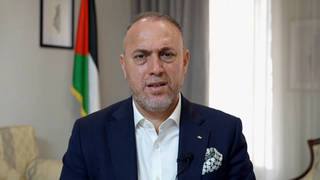
Israel is intensifying its war across the Gaza Strip, with the official death toll now over 35,000, including more than 14,500 children. More than 360,000 Palestinians have now been displaced from Rafah as Israeli forces ramp up their attacks there despite warnings from the United States and others against an escalation in the southern city, where more than a million Palestinians had sought shelter. This comes as the United Nations General Assembly voted 143-9 on Friday in support of full membership for Palestine, with 25 countries abstaining. The measure grants new rights to privileges to Palestine, though it can’t become a full U.N. member without support from the Security Council, where the U.S. vetoed a Palestine statehood resolution last month. “The last seven months have unmasked, beyond doubt, many things, including the hypocrisy, selectivity, double standards of certain international actors, and I believe the U.S. administration is right at the top of that list,” says senior Palestinian diplomat Husam Zomlot, currently serving as ambassador to the United Kingdom. Zomlot also casts doubt on the claim Israel lacks clear goals in its assault on Gaza. “Israel does have a plan, and Israel is executing the plan with almost perfection. And the plan is genocide.”
This content originally appeared on Democracy Now! and was authored by Democracy Now!.
This post was originally published on Radio Free.
This content originally appeared on Radio Free Asia and was authored by Radio Free Asia.
This post was originally published on Radio Free.
This content originally appeared on Democracy Now! and was authored by Democracy Now!.
This post was originally published on Radio Free.
This content originally appeared on Democracy Now! and was authored by Democracy Now!.
This post was originally published on Radio Free.
This content originally appeared on Democracy Now! and was authored by Democracy Now!.
This post was originally published on Radio Free.
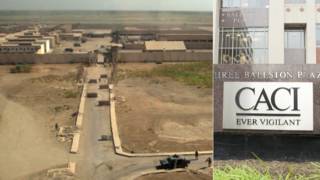
A historic case against U.S. military contractor CACI brought by three Iraqi survivors of torture at the notorious Abu Ghraib prison in Iraq ended in mistrial in Virginia last week after the jury failed to reach a unanimous verdict. The lawsuit against CACI — which was hired to provide interrogation services at Abu Ghraib — was first filed by the Center for Constitutional Rights in 2008. Since then, CACI repeatedly attempted to have the case dismissed. Plaintiffs Suhail Al Shimari, Asa’ad Zuba’e and Salah Al-Ejaili had accused CACI of conspiring to commit war crimes at Abu Ghraib. The three were subjected to sexual abuse and other forms of torture by interrogators. Democracy Now! speaks with Baher Azmy, attorney in the case and legal director of the Center for Constitutional Rights, who said it was “a historic human rights case” despite the outcome. “What they could not stop is three courageous human beings who stood up against every obstacle and told their story in a U.S. court in a breathtaking, compelling manner. And while we didn’t get a judgment from a jury, we got historical testimony that makes clear, I think, CACI’s responsibility for these clients’ harms,” says Azmy, who adds that they intend to retry the case.
This content originally appeared on Democracy Now! and was authored by Democracy Now!.
This post was originally published on Radio Free.
This content originally appeared on Radio Free Asia and was authored by Radio Free Asia.
This post was originally published on Radio Free.
This content originally appeared on Democracy Now! and was authored by Democracy Now!.
This post was originally published on Radio Free.
This content originally appeared on Democracy Now! and was authored by Democracy Now!.
This post was originally published on Radio Free.
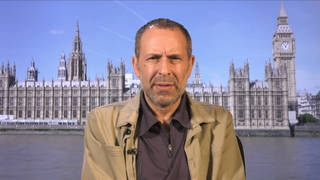
Even after Hamas accepted a Gaza ceasefire proposal Monday, Israeli forces moved in with tanks to seize the Rafah crossing with Egypt. Israel says the ceasefire deal falls short of its demands, and Hamas has called for “international intervention.” Former Israeli peace negotiator Daniel Levy says the limited information and political maneuvering of all parties raises more questions than answers right now, but the core issue is whether all parties can maintain a sustained end to hostilities. “In addition to testing each other, the Hamas and Israeli parties are testing the United States of America and the Biden administration in an unprecedented way,” says Levy. “Hamas detects that the U.S. may finally be serious about offering a sustained calm.” While Levy says growing external pressure from global protests are “having an impact,” he doubts U.S. and Israeli leaders feel they must change course yet. “The pressure does not feel sufficient that Netanuahu’s politics needs him to accept a ceasefire. He still thinks he can wiggle out of this,” says Levy. “If this deal doesn’t go through, I fear we’re in for the much longer haul.”
This content originally appeared on Democracy Now! and was authored by Democracy Now!.
This post was originally published on Radio Free.
This content originally appeared on Democracy Now! and was authored by Democracy Now!.
This post was originally published on Radio Free.
This content originally appeared on Democracy Now! and was authored by Democracy Now!.
This post was originally published on Radio Free.
This content originally appeared on Democracy Now! and was authored by Democracy Now!.
This post was originally published on Radio Free.
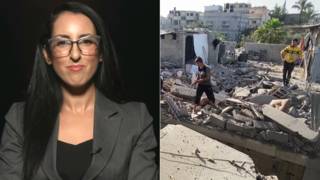
Democracy Now! speaks with Hala Rharrit, the first State Department diplomat to publicly resign over the Biden administration’s policies backing Israel’s assault and siege of the Gaza Strip. Rharrit is an 18-year career diplomat who served as the Arabic-language spokesperson for the State Department in the region. “I could no longer be a part of the State Department and promote this policy. It’s an inhumane policy. It’s a failed policy that is helping neither Palestinians, neither Israelis,” Rharrit says. “We are not authorized to send military equipment, weapons to countries that commit human rights abuses. ICJ has determined plausible genocide, yet we are still sending billions upon billions of not just defensive weaponry, but offensive weaponry. It is tantamount to a violation of domestic law. Many diplomats know it. Many diplomats are scared to say it.” She adds, “I read the talking points that we were supposed to promote on Arab media. A lot of them were dehumanizing to Palestinians.” Rharrit also discusses how “corruption” in government allows for arms sales to continue. “I could not help but be concerned about the influence of special interest groups, of lobbying groups on our foreign policy and, as well, on Congress — on the people that decide whether or not some of those shipments of arms get sent. The bottom line is that our politicians should not be profiting from war. And unfortunately, we have some institutionalized corruption that enables that,” she says.
This content originally appeared on Democracy Now! and was authored by Democracy Now!.
This post was originally published on Radio Free.
This content originally appeared on Democracy Now! and was authored by Democracy Now!.
This post was originally published on Radio Free.